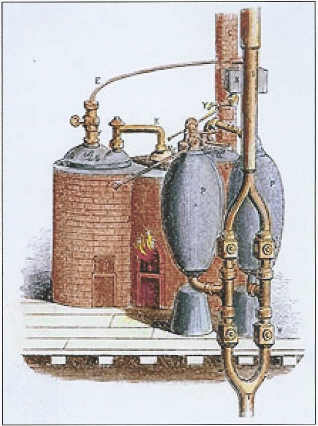James Watt dramatically improved the steam engine, but he didn’t invent it. In his time, steam engines were already a practical and economical success. The machines of Thomas Newcomen and Thomas Savery had already begun the new era in human technology.
Savery had a head for marketing as well as for steam. In 1702 he produced a pamphlet advertising his device as “An Engine to Raise Water By Fire”. His description may have been poetic, but it was literally exact. His engine pumped water by burning coal. Its killer application was draining coal mines.
Humans may have discovered fire in distant prehistoric times, but the really useful thing about fire was only discovered in the 18th century. Never mind cooking or smelting metal or scaring wolves: fire can raise an awful lot of water. And if you can raise water, you can do pretty much anything, because raising water means you can exert force.
Humans may have discovered fire in distant prehistoric times, but the really useful thing about fire was only discovered in the 18th century. Never mind cooking or smelting metal or scaring wolves: fire can raise an awful lot of water. And if you can raise water, you can do pretty much anything, because raising water means you can exert force.
Savery’s and Newcomen’s engines were crude and simple, and by that I don’t mean that they were primitively made, rattling too much or leaking steam. They were just stupid designs, compared to Watt’s machines. They didn’t even use steam pressure to actually do their work, but just let the steam balance atmospheric pressure. Then they condensed the steam, by shooting in cold water, and let the suddenly unbalanced atmospheric pressure do the work. Savery’s engine didn’t even turn any moving parts, but just sucked water through pipes. It wasn’t so much more than a proof of concept, like the aeolipile.
Hindsight is 20/20, of course, and it’s not really fair to call Savery and Newcomen stupid. Watt’s proper steam-pressure engines also needed stronger boilers. The point is that even the crudest engines were such a quantum leap in power technology, compared to wind, water, or animal power, that they rapidly changed the world. In effect they turned lumps of coal into unprecedentedly huge amounts of practical work. Up until 1775, the Russian navy had been using two enormous windmills to drain its dry docks at Kronstadt; each time they drained the docks in order to work on a ship, the draining job took a year. When they installed a single Newcomen engine, it did the job in two weeks.
With coal-fired steam engines, the human capacity to exert physical force suddenly soared. Even today, the biggest problem with changing to power sources other than combustion is that fire can provide so much more power than, say, sunlight or wind. We humans keep thinking wistfully about switching away from combustion, to some form of clean energy, but we really want to maintain our current energetic lifestyle. We're like a big city lawyer who wants to quit the firm and become a social worker, but also wants to keep up the mortgage payments.
Why is fire so very good for raising water? I have some thoughts on this, based on the fact that fire glows.
Why is fire so very good for raising water? I have some thoughts on this, based on the fact that fire glows.


No comments:
Post a Comment